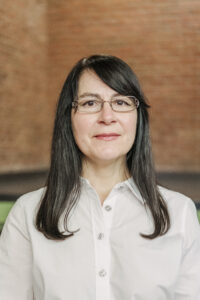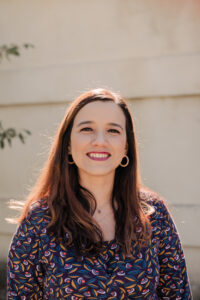 Irina Golubeva, Professor of Intercultural Communication in the Department of Modern Languages, Linguistics & Intercultural Communication; Affiliate Professor in Language, Literacy and Culture Doctoral Program
Irina Golubeva, Professor of Intercultural Communication in the Department of Modern Languages, Linguistics & Intercultural Communication; Affiliate Professor in Language, Literacy and Culture Doctoral Program
Dr. Golubeva teaches and publishes in four languages: English, Hungarian, Russian and Spanish.
Professor Golubeva’s main research interests concern the development of multilingual awareness and intercultural competence, internationalization of Higher Education, and conceptualization of intercultural citizenship. She served as the INCC MA program director from 2020 to 2023, and she is also the Co-director of the Intercultural Leadership Certificate Program. In 2020, she received the Pedagogy and Teaching Award and the title of “UMBC Innovation Fellow” for her contribution to fostering inclusiveness and intercultural dialogue on campus, and for enhancing students’ engagement in Internationalization at Home. Dr. Golubeva is strongly committed to non-profit work and served for seven years as a Vice-President of the European Association of Teachers. Most recently, in 2021, she was elected to the Board of the International Academy of Intercultural Research.
Websites:
https://www.researchgate.net/profile/Irina_Golubeva
https://umbc.academia.edu/IrinaGolubeva
David Beard, Assistant Professor in Linguistics and Spanish in the Department of Modern Languages, Linguistics & Intercultural Communication. Principal investigator and head of UMBC’s laboratory on Bilingualism: Education, Acquisition, Research and Design.
Professor Beard Is an applied linguist whose research areas include second language acquisition, bilingualism, psycholinguistics, corpus linguistics, the bilingual lexicon, second language vocabulary development, technology in the world language classroom, implicit/explicit learning and teaching,and learned attention. Two of his current projects include Texts in Spanish for Teachers (TST) and the Perceived Lexical Distance Project (PLDP). The first is freely available computer application with a stored database of texts in Spanish that can be searched for by difficulty level, and the second is an experimental psycholinguistic approach to measure lexical distances between languages and compare them to historical accounts of lexical similarity. Finally, he is currently looking for research assistants to work in his lab.Please contact him if you are interested.Twitter: @1psycholinguist
 Erin K. Hogan, Associate Professor, Department of Modern Languages, Linguistics and Intercultural Communication
Erin K. Hogan, Associate Professor, Department of Modern Languages, Linguistics and Intercultural Communication
Dr. Hogan’s research specializes in contemporary Iberian cultural production with particular interest in the child as biopolitical figure, gynocentric filmic representations of and by women, and the uses of comedy and social satire. Her broader areas of inquiry span time, place, discipline, and media from 17th century Spain to contemporary Latin American and transnational screen arts, intercultural pedagogy, and videographic criticism.
Websites: https://umbc.academia.edu/ErinHogan
CineMaestro: https://sites.google.com/umbc.edu/cinemaestro
 Omar Ka, Professor, Department of Modern Languages, Linguistics and Intercultural Communication: Affiliate Professor, Language, Literacy and Culture Doctoral Program
Omar Ka, Professor, Department of Modern Languages, Linguistics and Intercultural Communication: Affiliate Professor, Language, Literacy and Culture Doctoral Program
My current research includes Language Planning and Education in Senegal; Wolof Prosodic Structure; a Wolof Reader for advanced learners which will include sociolinguistic and ethnographic information. I am particularly interested in, first the language planning and language policy issues that African countries are facing in their attempt to develop literacy, and second the analysis of the Wolof language in its phonology and morphology, as well as its teaching. Still within Sociolinguistics, I am also interested in code-switching behavior and processes in multilingual societies, and how they affect language structure and language teaching.
 Renée Lambert-Brétière, Associate Professor, Department of Modern Languages, Linguistics and Intercultural Communication; Affiliate Associate Professor, Language, Literacy and Culture Doctoral Program
Renée Lambert-Brétière, Associate Professor, Department of Modern Languages, Linguistics and Intercultural Communication; Affiliate Associate Professor, Language, Literacy and Culture Doctoral Program
Dr. Lambert-Brétière’s research focuses on the relationship between language and culture,and on ethnolinguistic fieldwork-based documentation and description of endangered languages, from a discourse-based functional, typological and cognitive linguistics perspective.She has ongoing research projects on three very different languages in different parts of the world: Innu, an indigenous Algonquian language of Canada; Fon, a Kwa language spoken in Benin in West Africa; and Kwoma, a non-Austronesian language of Papua New Guinea. She Is also interested in the genesis of French-based Caribbean creoles, languages formed by the contact between African and European languages.
 John Stolle-McAllister, Professor and Associate Dean
John Stolle-McAllister, Professor and Associate Dean Kyung-Eun Yoon, Associate Professor and Coordinator of Korean, Department of Modern Languages, Linguistics and Intercultural Communication; Affiliate Faculty of the Asian Studies Program; Affiliate Faculty of Language, Literacy, and Culture Doctoral Program. Dr. Yoon’s research interests are conversation analysis, discourse analysis, and second/foreign language teaching, related to the Korean language and culture. She analyzes different types of discourse to examine the interfaces among language, actions and socio-cultural values and identities in various settings. Her recent book examines the complaining activity in conversation and online interaction in Korean, regarding linguistic characteristics for complaining, organizational features of the complaining activity including the responses, and socio-cultural norms and identities constructed in the course of the complaining activity.
Kyung-Eun Yoon, Associate Professor and Coordinator of Korean, Department of Modern Languages, Linguistics and Intercultural Communication; Affiliate Faculty of the Asian Studies Program; Affiliate Faculty of Language, Literacy, and Culture Doctoral Program. Dr. Yoon’s research interests are conversation analysis, discourse analysis, and second/foreign language teaching, related to the Korean language and culture. She analyzes different types of discourse to examine the interfaces among language, actions and socio-cultural values and identities in various settings. Her recent book examines the complaining activity in conversation and online interaction in Korean, regarding linguistic characteristics for complaining, organizational features of the complaining activity including the responses, and socio-cultural norms and identities constructed in the course of the complaining activity. Vira Zhdanovych earned her MFA from Kyiv National I. K. Karpenko-Kary University of Theatre and Cinema in 1988. She earned an MA from the Kyiv Higher Banking School, International Center of Marketing and Business, Finances and Credit in 1997. Ms. Zhdanovych joined UMBC in 2007 in the Russian Area and has taught Russian from the introductory through the graduate level, and topical seminars, including Political Russian, Russian Through Song, Russian Cinema, and Russian for Security and Defense. Ms. Zhdanovych is also interested in cross-cultural and interdisciplinary studies pertaining to Russia and Ukraine.
Vira Zhdanovych earned her MFA from Kyiv National I. K. Karpenko-Kary University of Theatre and Cinema in 1988. She earned an MA from the Kyiv Higher Banking School, International Center of Marketing and Business, Finances and Credit in 1997. Ms. Zhdanovych joined UMBC in 2007 in the Russian Area and has taught Russian from the introductory through the graduate level, and topical seminars, including Political Russian, Russian Through Song, Russian Cinema, and Russian for Security and Defense. Ms. Zhdanovych is also interested in cross-cultural and interdisciplinary studies pertaining to Russia and Ukraine.





